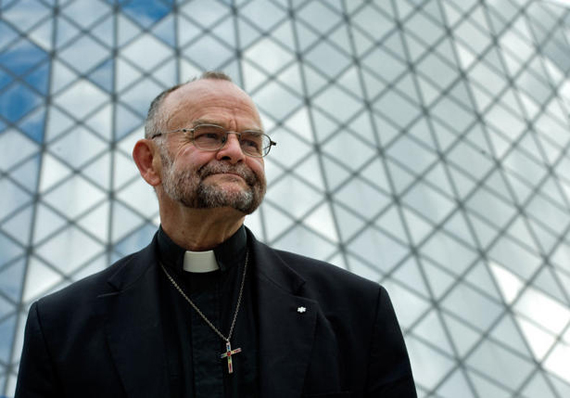
UPDATE :: Rev. Brent Hawkes was found not guilty of indecent assault and gross indecency in a Kentville, N.S. court on Tuesday January 31 by Judge Alan Tufts, who said he found inconsistencies in the testimony of the witnesses.
April, 2016 :: Earlier this month, Reverend Dr. Brent Hawkes pleaded not-guilty to decades-old sex-crime allegations. None of the allegations have been proven in court; Hawkes trial is set to begin November 1 in Nova Scotia. A fund to support Brent Hawkes has been established.
Here is our never-before published 2014 conversation with the LGBTQ icon:
Shaun Proulx: You’re a hero of mine, for your work in your church, your work outside of the church as a leader of the Human Rights movement here in Canada, and around the world. Do you step into a role like that, or does the role like that step into you?
BH: I think it’s an evolving situation. Certainly in the early days, MCC Toronto had to be one of the leading institutions dealing with human rights because a religious attack requires a religious response. One of the things our church has done very effectively every time the religious right attacks any gay rights movement or legislation – God versus gays; whenever they’re successful at that, we lose – has been to under-cut that argument, and to be up-front as a religious institution. Calling in other faith leaders from other traditions, doing press conferences and petitions so that they can’t say it’s God versus gays. I happen to be a stubborn Maritimer, who was raised with “you don’t mess with my family you don’t mess with my friends.” So you bring the best of that small town mentality of really caring about other people.
SP: I can’t help smile when I see you. I was at a restaurant months ago and you came over to my table to say hello, and I said, “Please come on my show”, but it’s so hard to get you. The pace you maintain would make a man in his early twenties drop.
BH: When you’re excited about what you do, you’re ready to put more into it, you put up with a lot. I get a lot of speaking engagements, the church is a large church, there’s a lot of administrative work around the church, so it’s a busy place.
SP: Has it always been easy to make MCC welcoming to everyone?
BH: It was easy to be welcoming to the gay and lesbian community in the early days because there were so few places where gay and lesbian people could worship, be spiritual, be sexual, and celebrate who they are, so that part was, I think, relatively easy, creating a safe space.
Over time we had to learn what it was like when more and more heterosexual people came to the church, and really loved what they saw, and wanted to be a part of the church. I think today, the shift now is more about inclusiveness around different faith perspectives. More recently, one of the main beliefs of our church is that there are many paths to God, and Christianity is one of those paths. So we see more and more folks coming to the church who have no church background, who would call themselves a skeptic or an atheist, or who would be from other religious traditions that either can’t find a place there that they like, or more often, can’t find one that’s exciting. We call ourselves a VIP church, vibrant and inclusive and progressive.
SP: What do you make of what I call spirituality, which, to me, has an absence of “a being” and more of “an energy”. Is that something that you explore, accept, encourage?
BH: Yes, absolutely! Some of the most recent research has shown that there’s a huge shift away from religion that is not toward atheism or secularism. It’s toward spirituality. So in the old days, people would say they’re religious, then they said they were more religious than spiritual, now their apt to say they’re more spiritual. But when people define that, they define spirituality as a sense that there’s something more, I don’t know what it is, but a sense that there’s something more, as a sense of awe and wonder and gratitude, and they define religion, in its best forms, as community and tradition. So I like to put those two things together. People can say they can practise their spirituality anywhere, and my response is, “but do you?”
SP: I have forever seared in my memory the same-sex wedding that you performed wearing a bulletproof vest, in defiance almost of the messy laws going on in Canada, taking advantage of the fact that we were in Ontario, and causing things to happen that lead to a guy like me to be able to get married. What do you make of the Human Rights movement now, compared to where it was then?
BH: It’s unbelievable. I became the pastor of our church in 1977. People were routinely kicked out of their jobs just for the rumor that they were gay. People were kicked out of their apartment buildings by their landlords if the landlord found out that they were gay. People were denied public services; people couldn’t get into the hospital emergency rooms to see their partner, if their partner was dying, because hospitals defined family. So it was a pretty scary situation. We’ve seen dramatic changes in that direction, in North America, in Canada in particular, and we have lead the way. However, and I always do the “however”, there’s still a lot more that needs to be done.
SP: When you have done the work you’ve done, it’s not possible for you to have escaped witnessing a lot of pain in a lot of people who are, I hate the word “victim”, but victims of the hate that goes on out there. I ask this when I interview nurses or people who are on the front lines, and you’re on the front lines. How have you handled the burden of watching how destructive homophobia can be when you’ve seen it , of the AIDS crisis as well, how have you managed to keep breathing?
BH: I think when that happens, you have a choice. You can either let that really demoralize you, and you can get paralyzed by the pain or you can be determined to make it motivational, to work even harder. I think that’s maybe where the stubborn piece comes in. So when I’ve seen the damage that religious institutions have done to people – when you think about the ex-gay movement and the number of people who have been driven into suicide or depression by the ex-gay movement – you can be determined to make sure that there’s an alternative, and that people have a positive alternative to choose.
SP: Do you feel like you’ve done enough? I know you’ve done more than ten people’s fair share.
BH: There are moments, like being the Grand Marshall of the Pride parade, it was an amazing honor at World Pride, and receiving the Order of Canada was unbelievable, but when I look around the world and realize there’s sixty-something countries in the world where a gathering of gay and lesbian people and their family and friends at a birthday party would be arrested and put in prison, everyone. In ten of those countries I would be executed simply for being gay. So yes I can say we’ve done a lot and we’re pleased with what we’ve accomplished, but there’s so much more that needs to be done. Legislation has been before the Senate of this country for four years, passed by Parliament twice to give transgender people protection, and Senate hasn’t even voted on it yet, and that’s an outrage!
SP: What is the intersection between sex and spirituality?
BH: Huge! A theological friend of mine said that the very act of sexual relationships, in particular, orgasm, is the closest we’ll ever find to a deep, deep spiritual experience. It’s not a coincidence that “Oh God!” is found exclaimed in the church and in the bedroom. I think sexuality is an amazing gift, and it’s a gift that needs to be exercised responsibly, I think there is a lot of creativity, a lot of fun and a lot of options that people have there. I see it as one of the wonderful gifts that God gives us.
SP: I said at the top of our talk that you’re one of my heroes. What’s the importance of heroes to you? Who is your hero?
BH: That average gay person who comes out to their family and risks rejection by their family; comes out to the pastor of their church and risks rejection by their church. Because coming out is the most powerful thing that people can do. It is more transformative than what any leader would ever do.
SP: I love the work you do, Brent, thank you so much.
– Shaun Proulx is the publisher of GGN. Join his #ThoughtRevolution on Facebook, Twitter and Instagram and hear him every weekend on SiriusXMCanadaTalks 167 or online here. If you’re in the Greater Toronto Area, read his weekly column, Spirit & The City in 24 Hours each Thursday.
– This interview was condensed and edited.





